Collagen is the most abundant protein in the human body, and it's responsible for providing structure and strength to our skin, bones, tendons, and ligaments. In the skin, collagen fibers form a scaffold that supports the epidermis, the outermost layer of skin. This scaffold helps to keep skin firm and elastic, and it also plays a role in wound healing.
As we age, our bodies produce less collagen, which can lead to wrinkles, sagging skin, and other signs of aging. However, there are a number of things we can do to protect our collagen and keep our skin looking its best.
In this interview, we speak to dermatologist Dr. Mamina Turegano about the benefits of collagen for skin, and how you can protect and support your collagen levels.
What is Collagen?
Collagen is a protein that is found in all connective tissues of the body, including the skin, bones, tendons, and ligaments. It is responsible for providing structure and strength to these tissues.
What Role Does Collagen Play in Skin?
In the skin, collagen fibers form a scaffold that supports the epidermis, the outermost layer of skin. This scaffold helps to keep skin firm and elastic, and it also plays a role in wound healing.
What are the Benefits of Collagen for Skin?
- Improves skin elasticity: Collagen, along with elastin, is responsible for giving skin its elasticity, or the ability to stretch and snap back into place. As we age, our collagen production decreases, which can lead to sagging skin and wrinkles.
- Reduces wrinkles and fine lines: Collagen helps to fill in wrinkles and fine lines, giving skin a smoother appearance.
- Improves skin hydration: Collagen helps to hold water in the skin, which keeps it hydrated and plump.
- Promotes wound healing: Collagen is essential for wound healing. It helps to form new tissue and repair damaged skin.
What Causes Collagen Decline?
There are a number of factors that can contribute to collagen decline, including:
- Aging: As we age, our bodies produce less collagen. This is a natural process, but it can be accelerated by certain factors, such as sun exposure, smoking, and poor diet.
- Sun exposure: UV rays from the sun can damage collagen fibers, leading to wrinkles and sagging skin.
- Smoking: Smoking damages collagen and elastin, two proteins that are essential for healthy skin.
- Poor diet: A diet that is deficient in vitamins and minerals can lead to collagen decline.
- Chronic diseases: Certain chronic diseases, such as diabetes and lupus, can also lead to collagen decline.
How Can You Protect Against Collagen Decline?
There are a number of things you can do to protect your collagen and keep your skin looking its best, including:
- Use sunscreen: Sunscreen is one of the most important things you can do to protect your skin from collagen damage. Be sure to apply sunscreen every day, even on cloudy days, with other sun protection measures.
- Avoid smoking: Smoking is one of the worst things you can do for your skin. It damages collagen and elastin, leading to wrinkles and sagging skin.
- Eat a healthy diet: A diet that is rich in vitamins and minerals is essential for healthy skin. Be sure to eat plenty of fruits, vegetables, and whole grains.
- Get enough sleep: When you don't get enough sleep, your body produces more cortisol, a hormone that can break down collagen. Aim for 7-8 hours of sleep per night.
- Manage stress: Stress can also lead to the production of cortisol. Find healthy ways to manage stress, such as exercise, yoga, or meditation.
What Ingredients Help to Skin Firmness and Elasticity?
- Vitamin C: Vitamin C is essential to maintain firm and youthful-looking skin. It helps to prevent the appearance of signs of aging caused by environmental damage.
- Retinol: Retinol is a form of vitamin A that helps to increase cellular turnover and improve the youthful apperance of skin. It also helps to improve skin texture and reduce the appearance of wrinkles.
- Peptides: Peptides are short chains of amino acids that function as essential building blocks for proteins crucial to skin structure and integrity. They can also help to improve skin elasticity and firmness.
- Proxylane™: Proxylane is a synthetic ingredient that helps strengthen skin’s extracellular matrix and increases skin elasticity and firmness.
Which SkinCeuticals Products Help to Correct Signs of Aging Caused by Collagen Decline?
SkinCeuticals offers a number of products that can help correct visible signs of aging impacted by collagen decline, including:
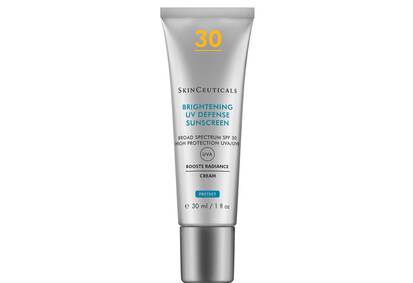
Brightening UV Defense Sunscreen SPF 30
This dual-action sunscreen provides broad-spectrum protection against UVA and UVB rays while evening skin tone and moisturizing skin.
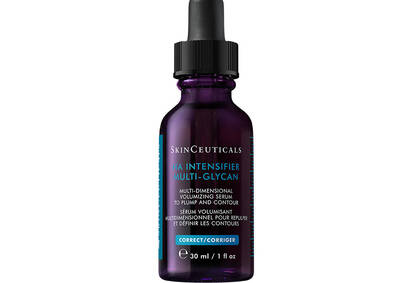
H.A. Intensifier Multi-Glycan
This serum contains hyaluronic acid, which helps to keep skin hydrated. It is clinically shown to help renew elasticity and firmness and define facial contours.
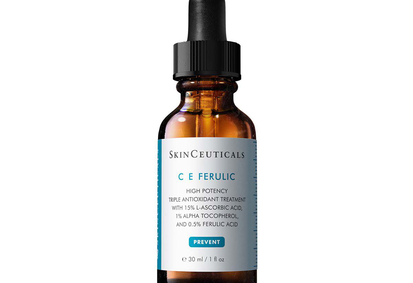
C E Ferulic
This best-selling antioxidant serum contains vitamins C and E and ferulic acid, which help to prevent visible signs of aging caused by environmental aggressors.

Mineral Radiance UV Defense Sunscreen SPF 50
This sunscreen provides broad-spectrum protection against UVA and UVB rays. It also contains zinc oxide and titanium dioxide, two physical sunscreens that help to reflect UV rays away from the skin.
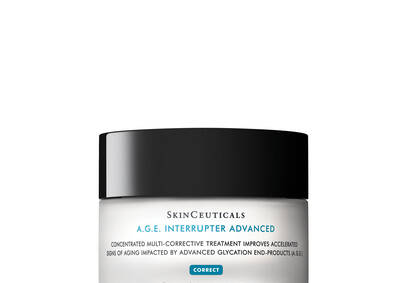
A.G.E. Interrupter Advanced
This next-generation corrective cream helps reverse visible signs of aging associated with glycation and collagen decline, including deep wrinkles.
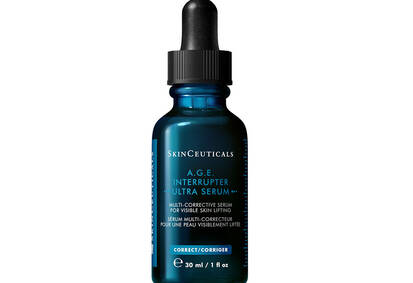
A.G.E. Interrupter Ultra Serum
This double-patented lifting serum helps visibly tighten 4 key facial areas from face to neck and help reverse signs of aging associated with collagen decline and glycation, such as wrinkles.
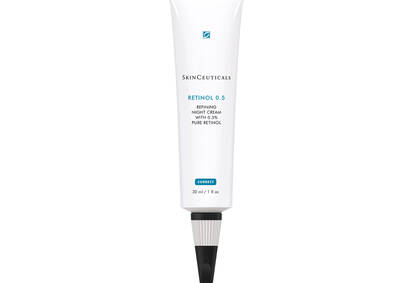
Retinol 0.5
This retinol cream works to diminish the appearance of fine lines, wrinkles, and uneven skin tone by encouraging cell turnover, leaving skin looking smoother and more youthful.
Which In-Office Treatments Are Recommended to Support Collagen?
SkinCeuticals also offers a number of in-office treatments that can help to support collagen production and improve the appearance of skin, including:
- Chemical peels: Chemical peels use a chemical solution to remove the outer layer of skin. This can help to improve the appearance of wrinkles, fine lines, and other signs of aging.
- Laser therapy: Laser therapy uses light energy to heat the skin and stimulate collagen production. This can help to improve the appearance of wrinkles, fine lines, and other signs of aging.
- Microneedling: Microneedling uses tiny needles to create micro-injuries in the skin. This stimulates the body's natural healing process, which can lead to increased collagen production.
- Radiofrequency (RF) therapy: RF therapy uses radio waves to heat the skin and stimulate collagen production. This can help to improve the appearance of wrinkles, fine lines, and other signs of aging.
- Ultrasound lifting treatments: Ultrasound utilizes focused energy to stimulate collagen production and tighten skin, offering a non-invasive method for skin rejuvenation.
To discover the best collagen-supporting products and treatments for your skin, use our online Routine Finder, or schedule an appointment with a SkinCeuticals Skincare Professional for a one-on-one consultation.
Next: 5 Types of Wrinkles and How to Treat Them















/Correct_Retinol0.5_30ml_INTL.jpg?sw=166&sh=166&sm=cut&sfrm=jpg&q=70)
/22_0429_SKC_PDP22_COR_RET_0.5_INTL_TEXTURE_2400x2400.jpg?sw=270&sm=fit&sfrm=jpg&q=70)





